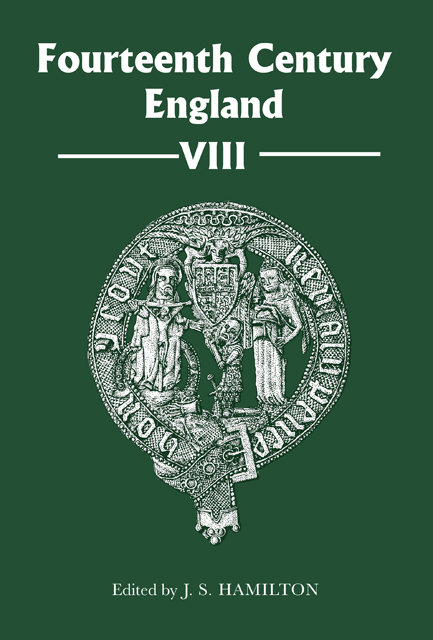Book contents
- Frontmatter
- Contents
- Contributors
- Preface
- Abbreviations
- King's Armourers and the Growth of the Armourer's Craft in Early Fourteenth-Century London
- In the Best Interest of the Queen: Isabella of France, Edward II and the Image of a Functional Relationship
- The First Entry of the Bishop: Episcopal Adventus in Fourteenth-Century England
- Temporalities Be Taken: Edward III, Unruly Ecclesiastics and the Fight for the Benefices of Exeter, 1337–60
- The Armour of Sir Robert Salle: An Indication of Social Status?
- Richard II, the Mortimer Inheritance and the March of Wales, 1381–84
- War, Chivalry and Regional Society: East Anglia's Warrior Gentry before the Court of Chivalry
- A ‘Sterre of þe See to ȝyue Lyȝt to Men’ and ‘Myrroure to Alle Sinful’: A Comparative Analysis of Biblical Women in the English Wycliffite Sermons with John Mirk’s Festial
- Index
- Fourteenth Century England issn 1471–3020
War, Chivalry and Regional Society: East Anglia's Warrior Gentry before the Court of Chivalry
Published online by Cambridge University Press: 15 February 2023
- Frontmatter
- Contents
- Contributors
- Preface
- Abbreviations
- King's Armourers and the Growth of the Armourer's Craft in Early Fourteenth-Century London
- In the Best Interest of the Queen: Isabella of France, Edward II and the Image of a Functional Relationship
- The First Entry of the Bishop: Episcopal Adventus in Fourteenth-Century England
- Temporalities Be Taken: Edward III, Unruly Ecclesiastics and the Fight for the Benefices of Exeter, 1337–60
- The Armour of Sir Robert Salle: An Indication of Social Status?
- Richard II, the Mortimer Inheritance and the March of Wales, 1381–84
- War, Chivalry and Regional Society: East Anglia's Warrior Gentry before the Court of Chivalry
- A ‘Sterre of þe See to ȝyue Lyȝt to Men’ and ‘Myrroure to Alle Sinful’: A Comparative Analysis of Biblical Women in the English Wycliffite Sermons with John Mirk’s Festial
- Index
- Fourteenth Century England issn 1471–3020
Summary
In recent decades the surviving late medieval records of the Court of Chivalry have received considerable scholarly attention. Presided over by the constable and earl marshal of England, the Court was in all likelihood extremely active during the age of the Hundred Years War. Its registers are now lost and only sporadic cases have survived, often in miscellaneous collections, or in later copies. The Court was usually the first port-of-call for military men who possessed unresolved grievances relating to campaigns on which they had served, and its jurisdiction principally covered matters relating to treason, ransoms, rights to prisoners, and rights to armorial bearings. The last of these types of disputes has been extensively treated,5 largely because testimony from three prominent armorial cases – Scrope v. Grosvenor (1385– 90), Lovel v. Morley (1386–87) and Grey v. Hastings (1407–10) – survive in bulk and indirectly reveal a great deal about the military careers and martial outlook of those gentry who gave evidence.
The first of these disputes pitted the Lancastrian retainer, Sir Richard Scrope, against the Cheshire knight, Sir Robert Grosvenor, with each man claiming the right to Scrope’s arms, azure a bend or. Lovel v. Morley and Grey v. Hastings were centred in East Anglia and revolved around the claims of John Lord Lovel of Oxfordshire and Wiltshire and Reginald Lord Grey of Ruthin to the respective arms of Thomas Lord Morley and Sir Edward Hastings, both of Norfolk. The Lovel v. Morley case was strongly linked to an earlier dispute in 1346–47, during which Nicholas Lord Burnell had unsuccessfully challenged Morley’s grandfather, Robert, for the same arms, while both cases were also indirectly related to wider land disputes between the protagonists.
Morley and Hastings were the defendants in their cases and Scrope was the plaintiff in his. All three required witnesses who could attest to having seen them, or their ancestors, bearing the disputed arms. Their witnesses thus comprised, on the one hand, an assortment of locals from their native regions who could point to public spaces, such as parish churches or manor houses, where their arms were displayed, and, on the other, militarily active men (often very active) who could attest that they, or their ancestors, had borne the arms on campaign.
- Type
- Chapter
- Information
- Fourteenth Century England VIII , pp. 119 - 146Publisher: Boydell & BrewerPrint publication year: 2014



